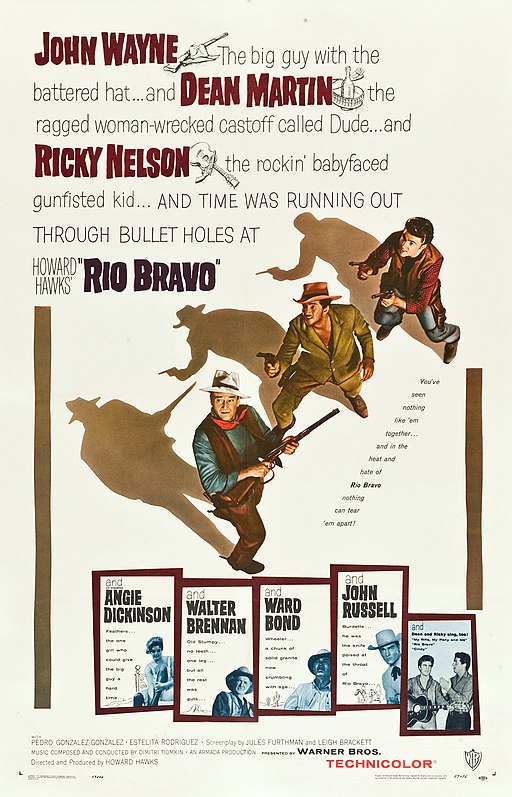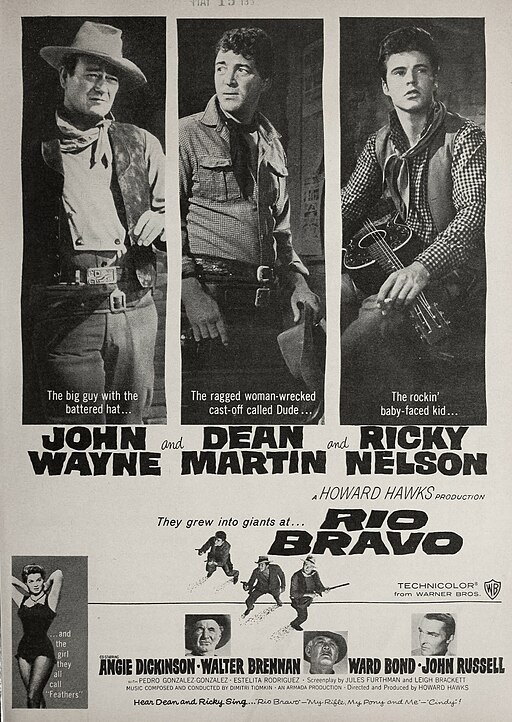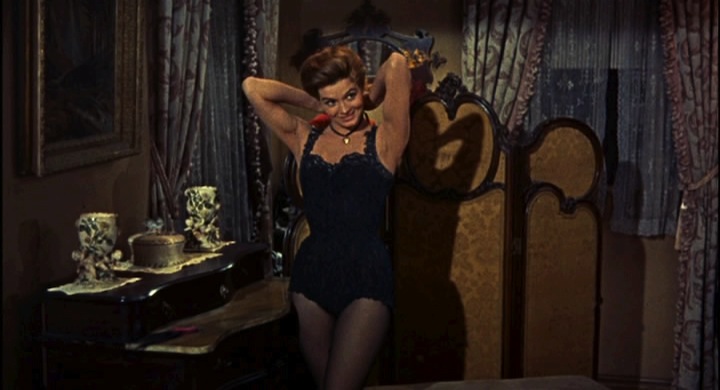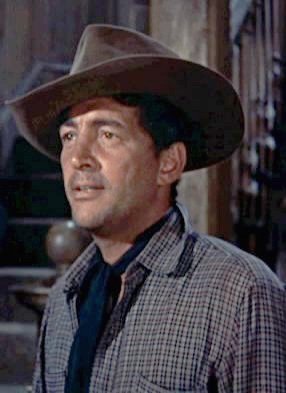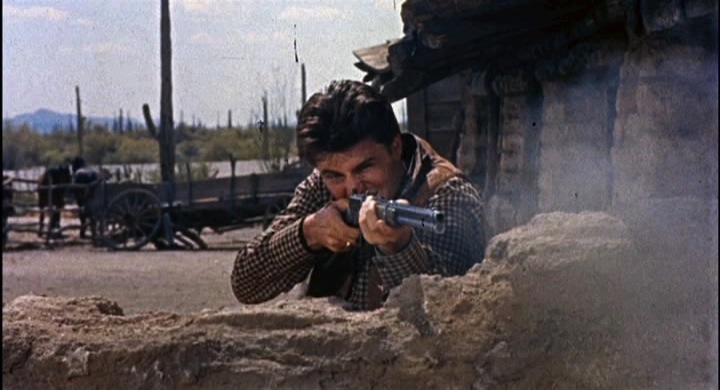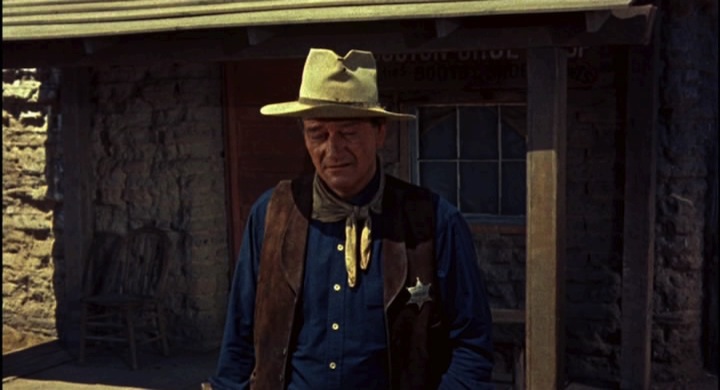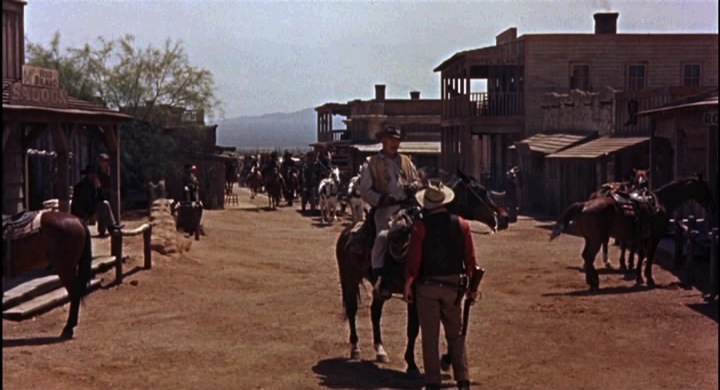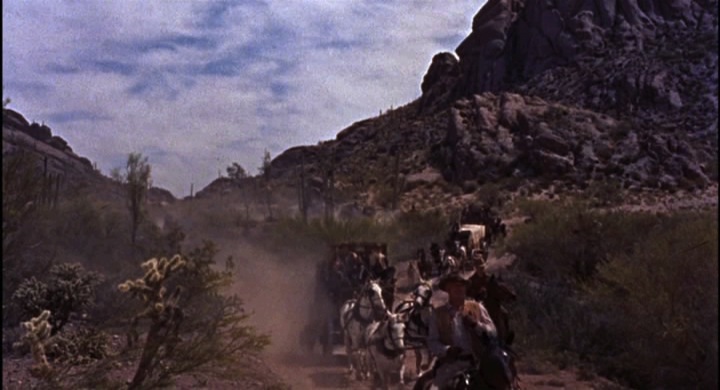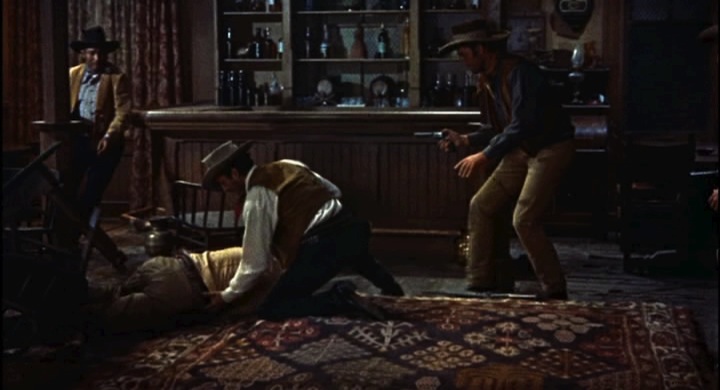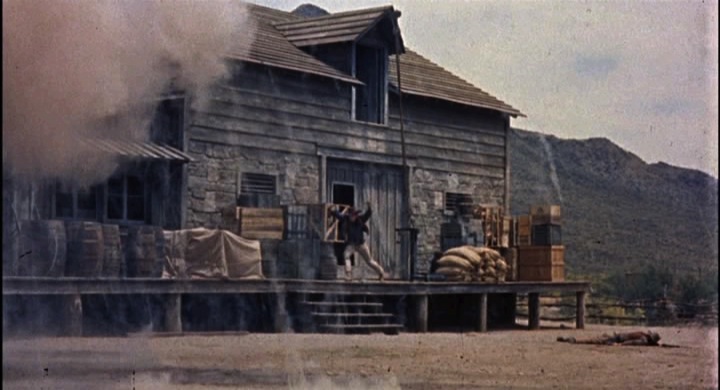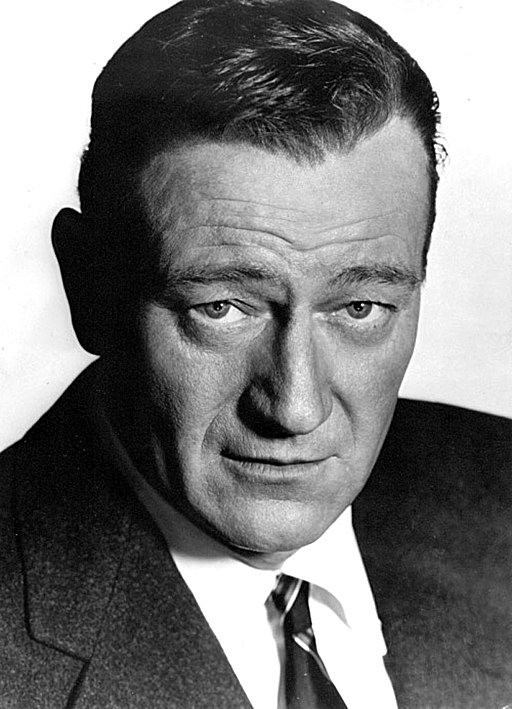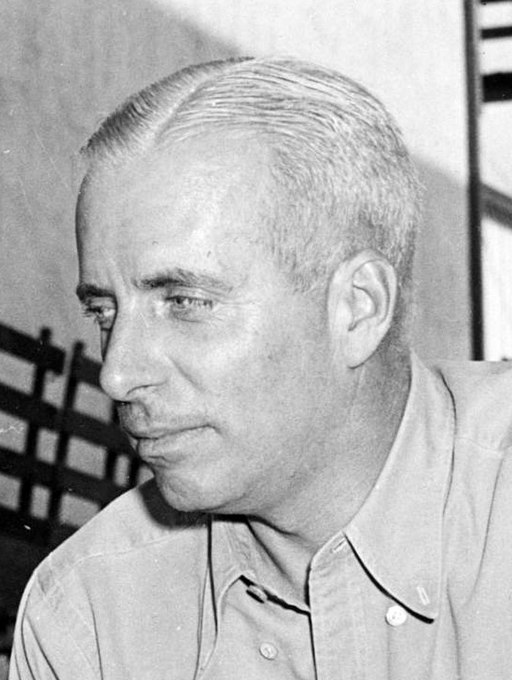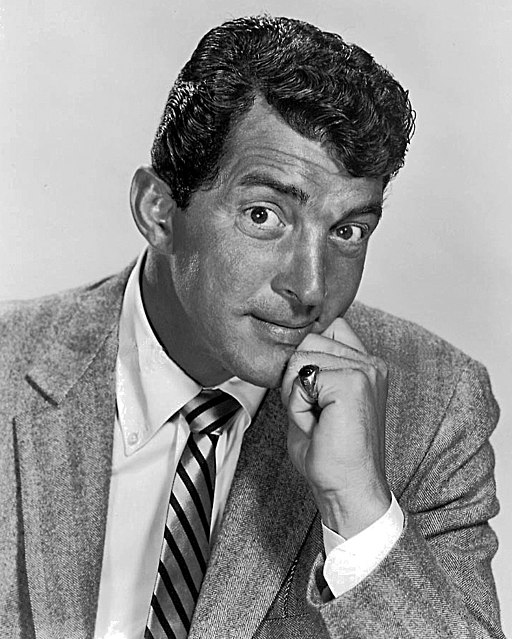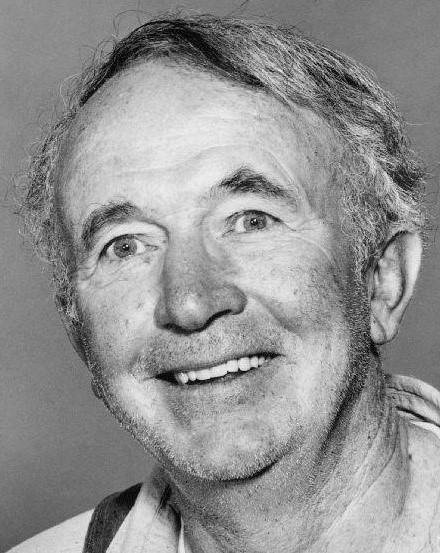Rio Bravo - 1959
back| Released by | Warner Bros. |
| Director | Howard Hawks |
| Producer | Howard Hawks |
| Script | Jules Furthman and Leigh Brackett |
| Cinematography | Russell Harlan |
| Music by | Dimitri Tiomkin |
| Running time | 141 minutes |
| Film budget | $ 1,2 million |
| Box office sales | $ 5,8 million |
| Main cast | John Wayne - Dean Martin - Ricky Nelson - Angie Dickinson - Walter Brennan |
Rio Bravo
A Timeless Western Tale of Camaraderie
"Rio Bravo" (1959), directed by Howard Hawks, is a classic Western set in a small Texas town. The story centers around Sheriff John T. Chance (John Wayne) who arrests a murderer, inciting a standoff with the criminal's powerful brother.
Assisted by a ragtag group including a recovering alcoholic deputy (Dean Martin), a young gunslinger (Ricky Nelson), and a cantankerous old man (Walter Brennan), Chance defends the town against a siege.
Related
Rio Bravo (1959)
Summary and Analysis
"Rio Bravo" is a 1959 Western film directed by Howard Hawks that has become a classic of the genre, celebrated for its storytelling, character dynamics, and direction. Here's a detailed summary and analysis:
Summary
Setting: The film is set in the small town of Rio Bravo, Texas.
Plot:
- Conflict: The story revolves around Sheriff John T. Chance (John Wayne) who arrests Joe Burdette (Claude Akins) for murder. Joe is the brother of powerful rancher Nathan Burdette, and his arrest sets the stage for the main conflict.
- Alliances: Chance is joined by a ragtag group: Dude (Dean Martin), a deputy struggling with alcoholism; Colorado Ryan (Ricky Nelson), a young gunfighter; and Stumpy (Walter Brennan), a cantankerous, crippled old man who guards the jail.
- Siege: The Burdette gang lays siege to the town, aiming to free Joe. The film builds tension as Chance and his deputies must defend themselves and their prisoner against overwhelming odds.
- Resolution: The climax sees a dramatic shootout. With clever tactics and unyielding resolve, Chance and his team overcome the Burdette gang. The film ends on a note of camaraderie and hope as order is restored.
Analysis
Themes:
- Law and Order vs. Anarchy: The film explores the thin line between civilization and lawlessness, with Sheriff Chance symbolizing the struggle to maintain order.
- Redemption: Dude's character arc is central, showcasing a journey from degradation to dignity, highlighting themes of personal redemption and resilience.
- Community and Solidarity: Despite their differences and personal struggles, the protagonists unite for a common cause, emphasizing the power of community.
Characterization:
- John T. Chance: A stoic, moral figure representing the idealized Western hero.
- Dude: His battle with alcoholism and his redemption arc provide emotional depth.
- Colorado Ryan: Embodies the youth and skill, bringing a new generation's perspective to the classic Western.
- Stumpy: Provides comic relief and symbolizes loyalty and tenacity.
Direction and Style:
- Howard Hawks' Direction: Hawks' style is evident in the film’s pacing, character-driven plot, and the balance of tension and humor.
- Cinematography: Russell Harlan's work captures the expansive Western landscape and the claustrophobic tension of the siege.
- Music: Dimitri Tiomkin's score adds to the film's atmosphere, blending traditional Western themes with character motifs.
Legacy:
- Influence: "Rio Bravo" has influenced numerous Westerns and is often cited by filmmakers as a template for character development and narrative structure.
- Cultural Impact: The film has been analyzed for its portrayal of masculinity, law enforcement, and moral values in the American West.
In conclusion, "Rio Bravo" stands as a landmark in the Western genre, not just for its entertainment value but also for its deeper exploration of themes relevant to American culture and society. Its blend of action, character, and moral complexity makes it a timeless classic.
Trailer of Rio Bravo:
Where was Rio Bravo Filmed?
"Rio Bravo" was primarily filmed at Old Tucson Studios in Tucson, Arizona, and in the nearby Sonoran Desert. These locations provided the quintessential Western landscape that was crucial for the film's authentic ambiance. The Old Tucson Studios, in particular, have been a popular filming location for many Western films, known for their realistic sets and beautiful desert backdrop. The choice of location contributed significantly to the film's classic Western feel, with its expansive landscapes and rustic, small-town settings.
The Direction of Howard Hawks Analyzed:
Howard Hawks, the director of "Rio Bravo" (1959), is widely regarded as one of the most versatile and skilled filmmakers in the history of American cinema. His direction in "Rio Bravo" is a testament to his distinct style and vision, showcasing several key aspects:
- Genre Versatility: Hawks was known for his success across various genres, but his work in the Western genre, particularly in "Rio Bravo," stands out. He brought a unique touch to the Western, blending action, drama, and humor seamlessly.
- Reinvention of the Western: In "Rio Bravo," Hawks challenged the conventions of the Western genre. He focused less on the expansive outdoor settings typical of Westerns and more on character interactions and dialogue within confined spaces, like the jailhouse and the saloon.
- Complex Characters: Hawks' direction emphasized deep, multifaceted characters. Each character in "Rio Bravo," from John Wayne's stoic sheriff to Dean Martin's troubled deputy, is given a rich backstory and emotional depth.
- Ensemble Cast: Hawks excelled in directing ensemble casts, creating a dynamic interplay between characters. In "Rio Bravo," the chemistry among the main cast members is palpable, driving the film's narrative and engaging the audience.
- Use of Space: Hawks' use of space in "Rio Bravo" is noteworthy. He masterfully utilized the interiors of buildings, creating a sense of claustrophobia and tension during the siege.
- Long Takes and Fluid Camera Work: Hawks often employed long, uninterrupted takes, allowing scenes to unfold naturally. This technique added to the film's realism and allowed the actors more freedom in their performances.
- Themes of Morality and Redemption: Hawks' films often explore themes of personal honor, morality, and redemption. In "Rio Bravo," these themes are embodied in the characters' struggles and growth, particularly in the redemption arc of Dean Martin's character.
- Masculinity and Friendship: Hawks' portrayal of masculinity, especially in the context of friendship and professional camaraderie, is a recurring theme. The male bonding and mutual respect among the main characters in "Rio Bravo" reflect this focus.
- Influencing Future Filmmakers: Hawks' direction in "Rio Bravo" influenced generations of filmmakers. His techniques in character development, pacing, and blending of humor and drama have been emulated and admired in countless films.
- Timeless Appeal: The film's enduring popularity is partly due to Hawks' skillful direction, which combined action, character depth, and storytelling in a way that remains engaging to contemporary audiences.
John Wayne’s Performance:
John Wayne's performance in "Rio Bravo" (1959) is a quintessential example of his iconic status in American cinema, particularly within the Western genre. His portrayal of Sheriff John T. Chance is marked by several key aspects that are characteristic of Wayne's style and contribute significantly to the film's impact:
Strong Screen Presence
- Commanding Presence: Wayne's physicality and charisma are central to his performance. He has a commanding presence that dominates the screen, embodying the archetypal Western hero with a natural ease.
- Subtle Expressiveness: Despite his rugged exterior, Wayne's performance is nuanced. He conveys a range of emotions through subtle facial expressions and body language, from stoicism and resolve to moments of vulnerability and humor.
Characterization of John T. Chance
- Moral Fortitude: Wayne portrays Sheriff Chance as the moral center of the film. His unwavering commitment to justice, despite the odds, is a hallmark of Wayne's roles in Westerns. He brings a sense of integrity and honor to the character.
- Leadership and Authority: Wayne's Sheriff Chance is a natural leader, respected and followed by others. He portrays this leadership with a mix of firmness and fairness, highlighting his ability to command respect without resorting to tyranny.
Interaction with Other Characters
- Chemistry with the Cast: Wayne's interactions with the ensemble cast, including Dean Martin and Ricky Nelson, are pivotal. His ability to play off his co-stars adds depth to the relationships within the film, particularly in scenes that require a blend of tension and camaraderie.
- Mentorship Role: In his interactions, particularly with Colorado Ryan (Ricky Nelson's character), Wayne's performance suggests a mentor-like role, adding a layer of paternal quality to his character.
Iconic Western Hero
- Embodying the Western Hero: Wayne's performance in "Rio Bravo" solidifies the image of the Western hero he had come to represent in American culture. He embodies the ideals of rugged individualism, moral conviction, and resilience.
- Balancing Toughness and Sensitivity: Wayne skillfully balances a tough, unyielding exterior with moments of gentleness and humor. This balance makes Sheriff Chance a relatable and enduring character.
Impact and Legacy
- Influence on the Genre: Wayne's performance in "Rio Bravo" has had a lasting impact on the portrayal of heroes in Westerns. His embodiment of the stoic, principled lawman set a standard for the genre.
- Cultural Icon: Through this role, and many others, John Wayne became an enduring symbol of a certain kind of American masculinity and heroism, influencing not just film but also the broader cultural understanding of these ideals.
Analysis of the Performance of Ricky Nelson:
Ricky Nelson's performance in "Rio Bravo" (1959) stands out as a unique and memorable contribution to the film, showcasing his talents not only as a musician but also as an actor. His portrayal of Colorado Ryan, the young gunslinger, is marked by several key aspects:
Youthful Energy and Charisma
- Fresh Presence: Nelson brought a youthful energy to the film, contrasting with the more seasoned personas of John Wayne and Dean Martin. His fresh-faced appearance and natural charisma added a new dimension to the traditional Western ensemble.
- Charm and Likability: Nelson's charm and likability are evident in his portrayal of Colorado. He balances a sense of youthful enthusiasm with a certain coolness and composure that is compelling to watch.
Subtlety and Understated Performance
- Understated Acting: Unlike the more overtly expressive styles of his co-stars, Nelson's performance is noted for its subtlety. He conveys his character's thoughts and emotions in a restrained manner, which adds a layer of intrigue to Colorado Ryan.
- Quiet Confidence: Nelson's portrayal is marked by a quiet confidence. He communicates strength and capability not through grand gestures but through understated actions and a calm demeanor.
Interaction with the Cast
- Chemistry with Co-stars: Nelson's interactions with the rest of the cast, particularly with Dean Martin and John Wayne, are noteworthy. He holds his own against these established actors, contributing to the dynamic interplay among the characters.
- Balance of Youth and Maturity: In his role, Nelson strikes a balance between the impetuosity of youth and a certain mature insightfulness. This adds depth to his character and enhances the film's exploration of mentorship and camaraderie.
Musical Performance
- Singing Talent: Nelson's musical talent is a highlight of the film. His performances of songs like "My Rifle, My Pony, and Me" and "Cindy" are not just entertaining interludes; they also serve to develop his character and the film's atmosphere.
- Integration of Music and Acting: The way Nelson integrates his singing into his acting performance enhances his character's charm and adds a unique element to the film that sets it apart from other Westerns.
Impact on the Film
- Appeal to a Younger Audience: Nelson's presence in the film helped to draw a younger audience, broadening the appeal of "Rio Bravo" beyond traditional Western fans.
- Memorable Role: Though his film career was not as extensive as his music career, his role in "Rio Bravo" remains one of his most memorable contributions to cinema.
Memorable Quotes from the Movie:
Sheriff John T. Chance (John Wayne): "Sorry don't get it done, Dude."
- Context: This line is delivered by Chance to Dude (Dean Martin), emphasizing the need for action and responsibility over mere apologies.
Dude (Dean Martin): "I'm not drunk – and I'm not leaving."
- Context: A moment where Dude asserts himself, indicating his determination to overcome his alcoholism and stand by his responsibilities.
Feathers (Angie Dickinson): "I thought you were never going to say it."
- Context: Feathers says this to Chance, reflecting the romantic tension and eventual connection between them.
Stumpy (Walter Brennan): "I'll get it done my own way."
- Context: Stumpy's declaration of independence and reliability, highlighting his quirky but dependable character.
Colorado Ryan (Ricky Nelson): "Sorry, I got held up."
- Context: A line that showcases Colorado's cool demeanor and sense of timing, particularly in moments of tension.
Sheriff John T. Chance: "You want that gun, pick it up. I wish you would."
- Context: A classic example of Chance’s tough, no-nonsense attitude, demonstrating his readiness to confront threats head-on.
Pat Wheeler (Ward Bond): "A game-legged old man and a drunk. That's all you got?"
- Context: This line, directed at Chance, underscores the seemingly inadequate defense they have against the Burdette gang, highlighting the film's theme of underestimation.
Feathers: "It's nice to see a smart man stay within his limitations."
- Context: Feathers' remark to Chance, showcasing her wit and the playful, flirtatious dynamic between them.
Dude: "The next time you shoot somebody, don't go near 'em till you're... sure they're dead!"
- Context: Dude's advice to Colorado, combining a sense of humor with the harsh realities of their situation.
Colorado Ryan: "I'd say you've had enough coffee for a while."
- Context: Colorado's line to Stumpy, a light moment that showcases the camaraderie among the characters.
Awards and Recognition:
"Rio Bravo," directed by Howard Hawks and released in 1959, did not receive a significant amount of awards attention, particularly from major award bodies like the Academy Awards or the Golden Globes. This is somewhat surprising given the film's enduring popularity and critical acclaim, but it reflects the cinematic landscape and the types of films being recognized during that era.
However, the film has achieved several notable recognitions post-release:
- National Film Registry: In 2014, "Rio Bravo" was selected for preservation in the United States National Film Registry by the Library of Congress. This honor is granted to films that are "culturally, historically, or aesthetically significant."
- Other Recognitions: The film has frequently appeared on various lists and critical assessments of the greatest films ever made, especially in the Western genre. While these are not formal awards, they signify the film's lasting impact and critical esteem.
Full Cast of Rio Bravo:
- John Wayne as Sheriff John T. Chance
- Dean Martin as Dude ("Borrachón")
- Ricky Nelson as Colorado Ryan
- Angie Dickinson as Feathers
- Walter Brennan as Stumpy
- Ward Bond as Pat Wheeler
- John Russell as Nathan Burdette
- Pedro Gonzalez Gonzalez as Carlos Robante
- Estelita Rodriguez as Consuela Robante
- Claude Akins as Joe Burdette
- Malcolm Atterbury as Jake (Stage Driver)
- Harry Carey Jr. as Harold (Burdette's Man)
- Sheb Wooley as Cowboy (Burdette's Man)
- Bob Steele as Matt Harris (Burdette's Man)
- Myron Healey as Barfly
- Walter Barnes as Charlie (Bartender)
- Fred Graham as Burdette Man at Shootout
- Nesdon Booth as Burdette Man at Shootout
- Bill Borzage as Card Player at Bar
- Danny Borzage as Barfly
- Eugene Borden as Joe Burdette's Cell Guard
- George Bruggeman as Townsman
- Ralph Bucko as Barfly
- Roy Bucko as Barfly
- Yakima Canutt as Townsman (uncredited)
- Noble 'Kid' Chissell as Barfly (uncredited)
- Cecil Combs as Barfly (uncredited)
- Tex Cooper as Townsman (uncredited)
- Gordon Dillman as Jake, Stage Guard (uncredited)
- John Doucette as Ned, Burdette's Man (uncredited)
- Al Haskell as Townsman (uncredited)
- Riley Hill as Barfly (uncredited)
- Earl Hodges as Barfly (uncredited)
- Rodolfo Hoyos Jr. as Pedro, Hotel Worker (uncredited)
- Eddie Juaregui as Barfly (uncredited)
- Jack Kenny as Barfly (uncredited)
- Ethan Laidlaw as Barfly (uncredited)
- Mike Lally as Barfly (uncredited)
- Cactus Mack as Barfly (uncredited)
- Ann McCrea as Sherry (uncredited)
- Frank Mills as Barfly (uncredited)
- Gordon Mitchell as Townsman (uncredited)
- Kansas Moehring as Barfly (uncredited)
- Montie Montana as Townsman (uncredited)
- Jack Perry as Barfly (uncredited)
- 'Snub' Pollard as Townsman (uncredited)
- Chuck Roberson as Burt, Burdette's Man (uncredited)
- Phil Schumacher as Barfly (uncredited)
- Rudy Sooter as Barfly (uncredited)
- Glenn Strange as Burdette Man in Shootout (uncredited)
- Brick Sullivan as Townsman (uncredited)
- Jack Tornek as Barfly (uncredited)
- Max Wagner as Barfly (uncredited)
- Henry Wills as Burdette Man in Shootout (uncredited)
- Fess Parker (voice only, uncredited)

